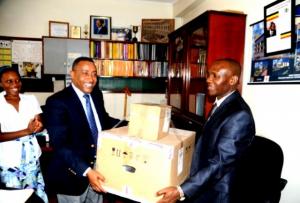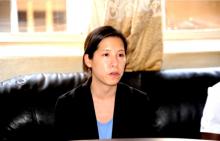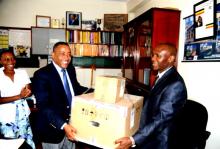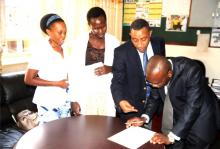WHO supports Research on Rotavirus diarrhea
Kampala, 27th March 2015:- Mulago National Referral Hospital received Rotaviral testing equipment from the World Health Organization (WHO) to be used in the sentinel surveillance site to boost Rotavirus surveillance before introducing Rotavirus vaccine in 2016.
Dr. Goitom Weldegebriel, the New Vaccines Surveillance Officer at WHO Regional Office handed over the equipment noting that it will be helpful in getting good data on the burden of the Rotavirus. He added that the data would be used to document the burden of the disease and guide introduction of the new vaccine.
Dr. Catherine Yen from Center for Disease Control and Prevention (CDC) Atlanta underscored the importance of this data saying that with this machine, Mulago Hospital will provide information that’ll be important in evaluating the impact of the vaccine when introduced.
Dr. Baterana Byaruhanga, the Executive Director of Mulago Hospital appreciated the concerted efforts to control diarrhea hospitalizations due to Rotavirus and committed Mulago Hospital’s continued partnership with WHO and CDC.
The equipment will be used to test stool samples from every child under the age of five years who is admitted to the hospital for rotavirus. The surveillance has been going on since 2008 and reliable data is needed to monitor the magnitude of the problem and to guide vaccine introduction.
Rotaviruses have been observed as a leading cause of severe diarrheal disease and dehydration in infants and young children throughout the world. The symptoms are seen in young children between the ages of three months and two years. The virus spreads rapidly, for instance through person-to-person contact, or possibly contact with contaminated things.
Symptoms usually appear approximately two to three days after infection, and include projectile vomiting and very watery diarrhea, often with fever and abdominal pain. The first infection is usually the worst.
There is no specific drug treatment for rotavirus infection, although oral rehydration therapy is recommended. There are two new vaccines to prevent severe rotavirus disease which will be introduced in Uganda in 2016.
___________________________________________
For more information, please contact:
Mwebembezi Edmond, Public Information Officer
Tel. : +256 414 335557
Cell: +256 782 962674
Email: mwembembezie [at] who.int (mwembembezie[at]who[dot]int)
___________________________________________
01. Dr. Catherine Yen from CDC Atlanta delivering her remarks
02. Dr. Goitom Weldegebriel WHO hands the Rota-viral testing machine to Mulago Hospital Executive Director Dr. Baterana Byaruhanga
03. Right to left Mulago Hopsital Executive Director Dr. Byraruhanga signs acknowledging receipt as Dr. Goitom Weldegebriel WHO Dr. Yunu Hellen Mulago Hospital and Dr. Annet Kisakye WHO look on






